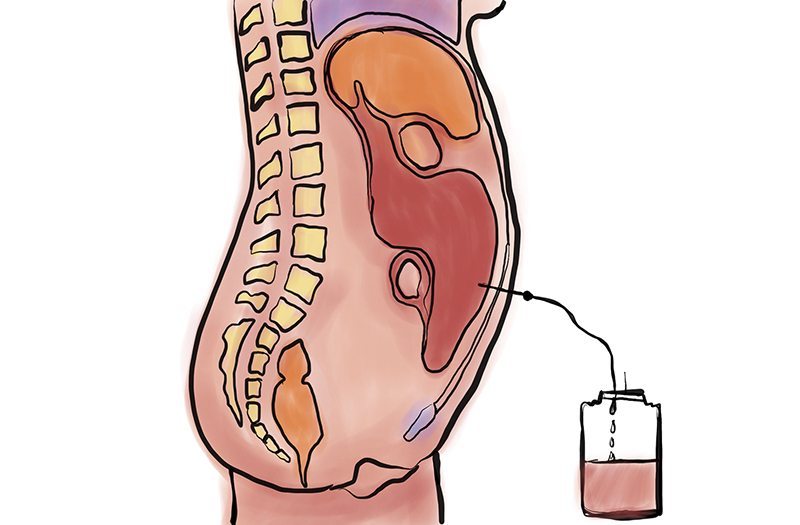Peritoneal mesothelioma is a rare and aggressive cancer that affects the peritoneum, the thin lining that covers the organs in the abdomen. It is caused by exposure to asbestos, a naturally occurring mineral fiber that was once widely used in construction and other industries.
Asbestos exposure can occur through inhalation or ingestion of asbestos fibers. When asbestos fibers are inhaled, they can become trapped in the lungs and cause inflammation and scarring.
This can lead to asbestosis, a chronic lung disease. In some cases, asbestos fibers can also travel to the peritoneum and cause peritoneal mesothelioma.
Ingestion of asbestos fibers is less common than inhalation, but it can also lead to peritoneal mesothelioma. This can happen if asbestos-contaminated dust or water is swallowed.
For example, people who worked in shipyards or factories where asbestos was used may have ingested asbestos fibers through dust that was tracked into their homes on their clothes.
MUST READ: How to Get a Loan to Start a Business, How to Apply
The risk of developing peritoneal meso increases with the amount of asbestos exposure. People who have been exposed to high levels of asbestos are at the highest risk. However, even low levels of exposure can increase the risk of developing the disease.
There is no cure for peritoneal meso, but there are treatments that can help to control the disease and improve the quality of life for patients. Treatment typically includes surgery, chemotherapy, and radiation therapy.
The following are the risk factors for peritoneal mesothelioma:
- Asbestos exposure: This is the most common risk factor for peritoneal mesothelioma.
- Male sex: Men are more likely than women to develop peritoneal mesothelioma.
- Age: The risk of developing peritoneal meso increases with age.
- Family history: People who have a family history of mesothelioma are at an increased risk of developing the disease.
- Smoking: Smoking increases the risk of developing peritoneal mesothelioma, especially in people who have also been exposed to asbestos.
- Other occupational exposures: Exposure to other substances, such as talc, erionite, and tremolite, may also increase the risk of developing peritoneal mesothelioma.
If you have been exposed to asbestos, it is important to be aware of the symptoms of peritoneal meso.
MUST READ: Top 10 Best Internet Service Providers in Los Angeles
These symptoms may include:
- Abdominal pain
- Swelling of the abdomen
- Nausea
- Vomiting
- Constipation
- Weight loss
- Fatigue
- Fever
- Cough
- Shortness of breath
If you have any of these symptoms, it is important to see a doctor right away. Early diagnosis and treatment are important for improving the chances of survival for people with peritoneal meso.
Here are some additional information about peritoneal mesothelioma:
- The average survival rate for peritoneal mesothelioma is 12 to 18 months. However, survival rates can vary depending on the stage of the disease at diagnosis, the patient’s age and overall health, and the type of treatment that is received.
- There is no one-size-fits-all treatment for peritoneal mesothelioma. Treatment will vary depending on the individual patient’s circumstances. However, treatment typically includes surgery, chemotherapy, and radiation therapy.
- Surgery is the main treatment for peritoneal meso. The goal of surgery is to remove as much of the cancer as possible. However, it is not always possible to remove all of the cancer.
- Chemotherapy is used to kill cancer cells that remain after surgery. Chemotherapy can be given before or after surgery, and it may also be given in combination with radiation therapy.
- Radiation therapy is used to kill cancer cells that cannot be removed by surgery. Radiation therapy can also be given before or after surgery, and it may also be given in combination with chemotherapy.
- There are a number of clinical trials underway that are evaluating new treatments for peritoneal mesothelioma. These trials are looking at new drugs, new combinations of treatments, and new approaches to treatment.
If you have been diagnosed with peritoneal mesothelioma, it is important to talk to your doctor about your treatment options. There is no one-size-fits-all treatment, so it is important to find a treatment plan that is right for you. There are also a number of support groups available for people with peritoneal mesothelioma and their families. These groups can provide emotional support and information about the disease.


Drop Your Comments, What do you think About The Article?